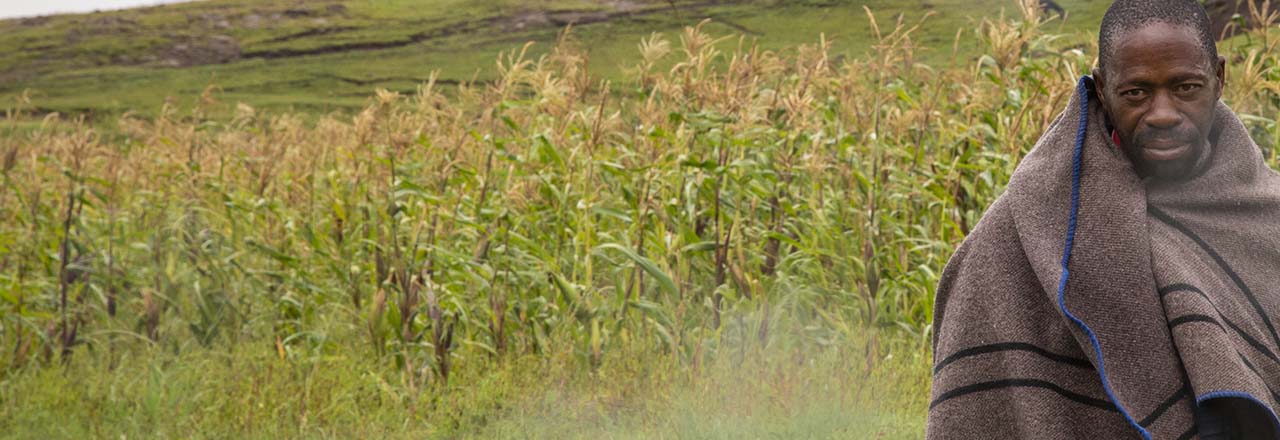

Restoring Farm and Range Lands in Lesotho
“Should I change my career? My aspiration in life is to be a long-term farmer, forever. I like to farm. Would you think that it is wise to choose that career path? Keeping in mind the climate change because, as we know, it affects farming. Last year it wasn’t the same, and this year it’s even worse.” —Ntsoaki Monts’I, farmer and ReNOKA field agent.
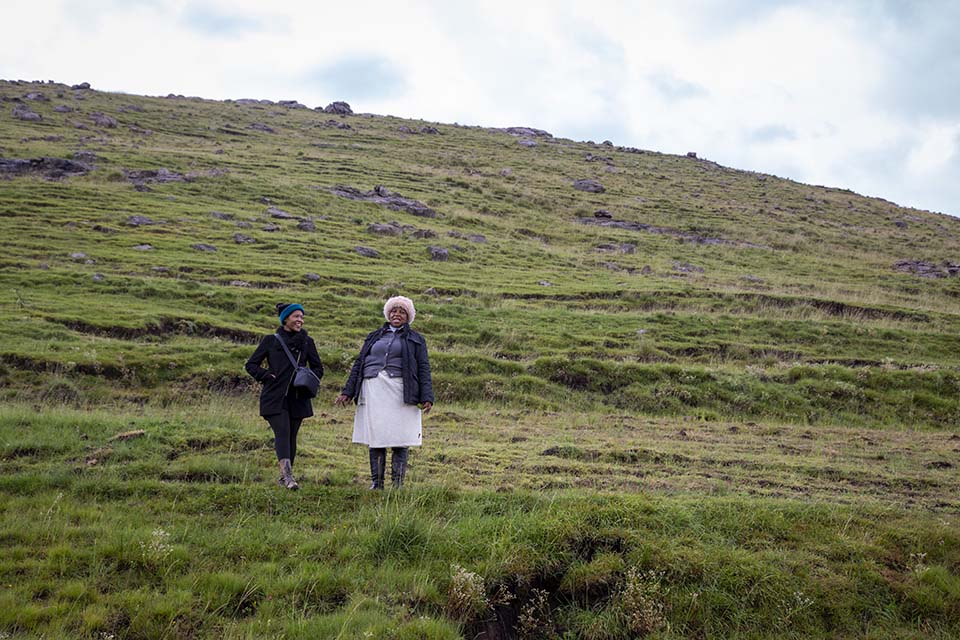
Field agent, Ntsoaki Monts’I, left, and her mother ‘Mamonaheng Monts’I, watershed team chairperson, restore rangelands in Maletsunyane, Lesotho.
Photo by Dooshima Tsee/CRS
Ntsoaki Monts’I is a watershed team field agent in Maletsunyane, a community in Lesotho. She educates farmers there about agricultural methods, and provides technical support to the watershed teams as they develop maps and plans to restore their livelihoods. But she is, first and foremost, a farmer herself. Ntsoaki has a deep connection to the land. Her family has farmed and reared animals on rangelands in Lesotho for generations.
But climate change, overgrazing and land degradation are causing erosion in Lesotho's catchment areas at such an alarming rate that they threaten traditional farming and herding culture as well as related livelihoods. Currently, less than 10%—667,000 acres—of Lesotho's total land area of 7.5 million acres is suitable for agriculture. Farmers like Ntsoaki and her neighbors, who depend on the land for food and income, are in the trenches of a global land degradation crisis.
When she was still a child, Ntsoaki’s parents passed down generations worth of knowledge about farming as she worked with them on their farm. She also spent three years studying for an agriculture and business management diploma at Lesotho College of Agriculture, graduating in 2020. Her library of traditional knowledge and her formal education gives her an intimate understanding of the land, a unique perspective, and a commitment to caring for and managing the rangelands.
“I grew up in a family that works with our hands. We plant a lot of food. Even though I went to a school for [agriculture], I went there already with some knowledge of how to take care of plants and how to work with my hands,” she says.
Climate concerns
Ntsoaki’s concerns about the climate and the land are familiar worries for many farmers in Lesotho. It gets a little more difficult each year for farmers to earn a living. A change in yearly weather patterns, degradation of the land and overgrazing contribute to poor outcomes for farmers and communities in these rangelands. As much as Ntsoaki loves the land, she would have no choice but to move if they cannot restore it.
She would be particularly sad to leave the informal lessons she gives to children in her community. As she learned from her parents, she now teaches teens and children as young as 9-years-old about caring for the land. She also takes them along to the farm and they plant vegetables that the children sell to make a little money.
“Young people are impatient and have to see results for their work. When they see they can earn money from the land, it makes it easier for them to appreciate the importance of taking care of the land.” Ntsoaki says.
As she sees fewer young people choose farming as a career, this is Ntsoaki’s way of ensuring the next generation is learning the skills they need to preserve their land for the future.
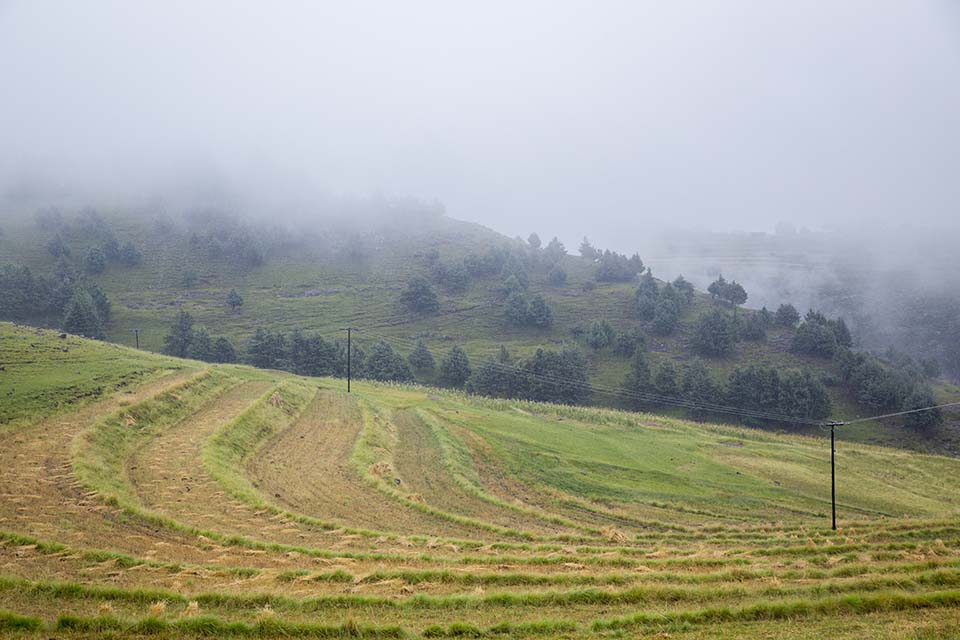
Farmers in Lesotho depend on rangelands for animal grazing and crop farming. The quality of rangelands here has been degrading over recent decades.
Photo by Dooshima Tsee/CRS
Land and water connections
Catholic Relief Services implements the ReNOKA project, a watershed management approach that leverages the connection between land and water resources to promote environmental protection and climate change adaptation while enhancing food security by using sustainable water resources.
Community watershed teams are essential to achieve these objectives. CRS established these teams to lead the process of mapping natural resources and, in collaboration with field agents, plan community watershed restoration. These are all volunteer roles for farmers and community members who are passionate about maintaining and restoring the rangelands their livelihoods depend on.
Communities select watershed team members. Then CRS trains teams in natural resource management. They gain the skills to mobilize their communities for land maintenance and restoration activities.
They build low stone retaining walls to prevent surface water run-off and soil erosion and increase water infiltration. They also build small dams to measure the rate of water flow across rivers and prevent flooding. Both methods help restore degraded land.
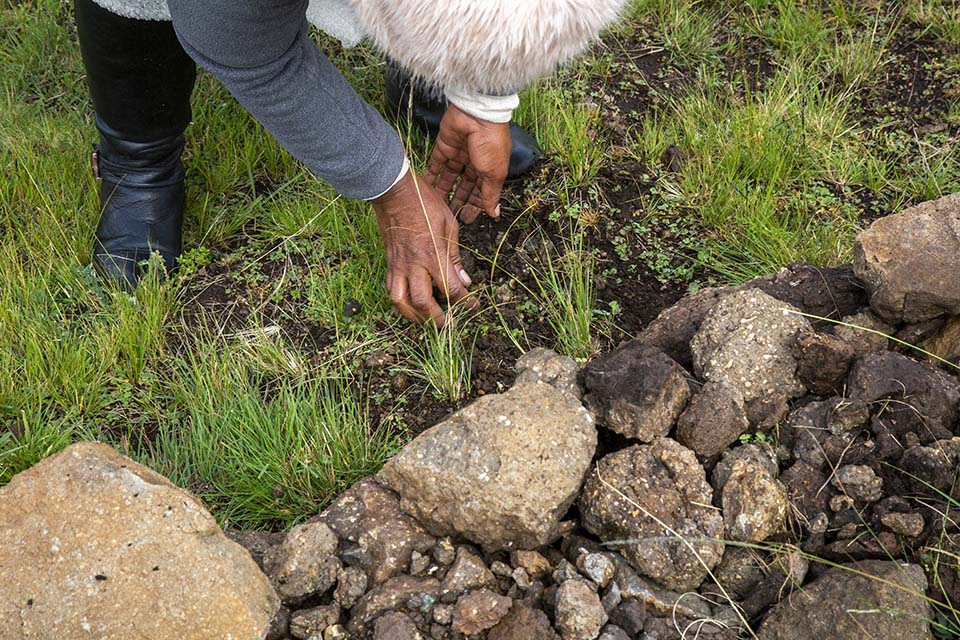
‘Mamonaheng Monts’i repairs a low stone retaining wall on a mountain side in Maletsunyane, Lesotho. Communities build retaining walls along the natural curve of the mountain to preserve water and soil, preventing runoff and improving soil fertility.
Photo by Dooshima Tsee/CRS
A cold, windy rain falls off and on as Ntsoaki’s mother, ‘Mamonaheng Monts’I, walks up the mountain. She is the team chairperson for Maletsunyane village. She does this steep trek almost daily and she is barely out of breath as she talks and walks.
Like most people in rural parts of Lesotho, ‘Mamonaheng grows crops and rears animals. She has 60 sheep, four cows, two horses and 10 donkeys. Lesotho gets cold winters, and it even snows in some parts of the country. This means, as in most temperate regions, farmers have a limited agricultural season.
When ‘Mamonaheng was younger, the growing season was longer. But now winters are longer. As the growing season shrinks, earning a living from agriculture becomes harder. Many families, particularly young people, migrate to lowlands with better weather for agriculture. This exacerbates overpopulation and over-farming in those areas.
‘Mamonaheng has had to move once already. She used to live about 60 miles away. In 2005, she decided to move to Maletsunyane because the rangeland around her former home was overtaken by invasive plants, and there was no grass for her animals to graze.
The watershed teams and their communities are hoping to change all that. Their stone walls trap silt, creating a nutrient-rich layer of topsoil and manure, making the soil more fertile. In years with high rainfall, they shield the land from heavy rains. During droughts, the walls help collect, store and diffuse rainfall to increase the water available to plants.
Pulling the community together to restore rangelands is not easy. It is a slow process. It can take years to see a difference. In a fast-paced world, many community members are skeptical about the importance of long-term activities like maintaining the stone walls. But farmers like ‘Mamonaheng understand patience.
“When you plant crops,” she says, “they do not grow overnight.”
However, changing weather patterns are testing even the steady patience of these hardy folk.
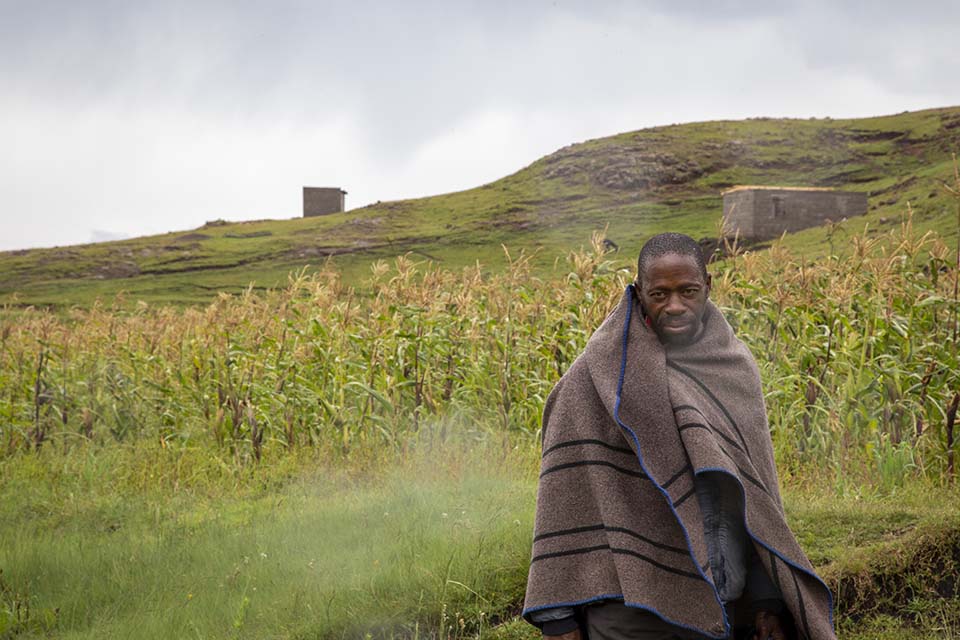
Lesole Nts’asa sits in a field where his animals graze in Maletsunyane, Lesotho. He’s a member of a watershed team that mobilizes its community to restore and improve rangelands.
Photo by Dooshima Tsee/CRS
“In the next 10 to 15 years, I would like to see people in this community who learn to improve the environment without expecting anything in return from anyone, but because it is going to improve their lives. I would like to see the rangelands improved as well, for the sake of our animals,” ‘Mamonaheng says.
Restoring ecosystems

Lesole Nts’asa checks dam in a stream in Maletsunyane, Lesotho. The dams monitor stream flow which helps farmers and communities understand trends in water degradation and the effects of climate events like droughts, flash floods and landslides.
Photo by Dooshima Tsee/CRS
Lesole Nts’asa rummages in the flowing stream to check the dam. He clears debris and checks the pressure of the water that flows out. This takes just a few minutes but it’s integral to preserving water and gathering information that Lesole and other herders can use to plan. The dams are a way to measure the water flow. They protect the environment and preserve biodiversity. Through the ReNOKA project, CRS provided the materials and training Lesole needs to monitor and understand water flow. ReNOKA field agents like Ntsoaki Monts’I also provide recurring monitoring and support if community members have questions or need support.

The majority of rural dwellers in Lesotho are herders and crop farmers who depend on healthy rangelands.
Photo by Dooshima Tsee/CRS
Lesole is a crop farmer and herder. He has 40 sheep, five cows, two horses and two donkeys. He has built his herd back up over eight years.
“To me as a herder, climate change means there is no rain to water the grass, and there is no food for my animals. They don’t get enough food to eat, and most of them die and some of them do not produce milk as much as they used to.” Lesole says.
In 2015, there was a drought, and because of low water levels in streams, Lesole lost 50 sheep. This work is personal for him. He never wants to experience that sense of hopelessness again.
“The [dam] measures the pressure of the water. It helps us keep track of water throughout the year so that we can prepare for dry seasons. We see if we can preserve water for ourselves so that we cannot lose our animals due to dry season.” Lesole says.
For these farmers and herders, caring for the land is a lifelong passion passed from one generation to the next. CRS is right there with them, supporting their commitment to maintain and restore their local ecosystems.
“When I see myself, even in 20 years from now and forever, I see myself as a farmer but a more improved farmer. In 20 years, I would like to have my own farm, a real farm. I would have animals, plants, fish, everything.” Ntsoaki says.
CRS is an implementing partner for the Deutsche Gesellschaft für Internationale Zusammenarbeit through the Support to Integrated Catchment Management program in Lesotho. The program is funded by the European Union and the German Government through the German Federal Ministry for Economic Cooperation and Development as well as the Government of Lesotho. It supports the rollout of a national program and citizen movement for integrated catchment management in Lesotho under the name ReNOKA, which means “we are a river” in the local Sesotho language. ReNOKA represents a multi-stakeholder and participatory approach to promote the integrated, sustainable, and risk-informed development and management of water and land in Lesotho's catchment areas and the Orange-Senqu River basin. This will lead to the conservation of biodiversity, land and water resources and advance climate resilience. It will leverage opportunities in the green economy, build on the water-energy-food security nexus, and contribute to improved urban and rural livelihoods, water quality and economic development in the country and the entire Southern African region.

